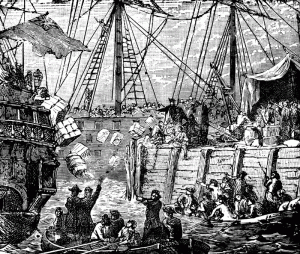At nine o’clock on the night of 16th December 1773, a group of angry Bostonians disguised as Mohawk Indians and armed with tomahawks boarded three British ships anchored at Griffin’s Wharf in Boston harbour. Urged on by thousands of cheering townspeople, the 70-odd colonists – including some of Boston’s most distinguished citizens – proceeded to axe open 342 chests of tea valued at $18,000 and heaved the lot into the Boston harbour in protest of heavy taxes placed by the British on American exports. Outraged and determined not to let this act of rebellion go unpunished, British Parliament retaliated immediately by passing a series of Coercive Acts (known by the colonists as the “Intolerable Acts”) against Massachusetts: the port of Boston was closed, the powers of self-government drastically reduced, and the colony was placed under rigid British military control. The severity of the Coercive Acts led to even greater resentment and resistance throughout all thirteen colonies, which in turn convened the First Continental Congress in order to petition King George III to repeal the acts. The king refused. And so it was that the audacious rebellion against imperialism and Draconian taxation, which famously came to be known as the Boston Tea Party, set in motion the chain of events that would lead directly to the American Revolution.
As a historical and iconic act, the Boston Tea Party is to modern Americans synonymous with the spirit of independence – being the very embodiment of the New World’s rejection of Old World tyranny. It is also significant as one of the first examples of mass civil disobedience; resistance to taxation had never before resulted in the large-scale and deliberate destruction of property. But it is worth noting that, were the Boston Tea Party to take place today, then every one of those so-called great patriots who participated would – under the Federal Bureau of Investigation’s current guidelines – be classified as “terrorists”. Hence, when casting our judgement on current dissenters and freedom fighters, it is wise to remember that political acts of dissent are always measured solely by their success or failure – for, as Winston Churchill said, “history is written by the victors.”



3 Responses to 16th December 1773 – The Boston Tea Party